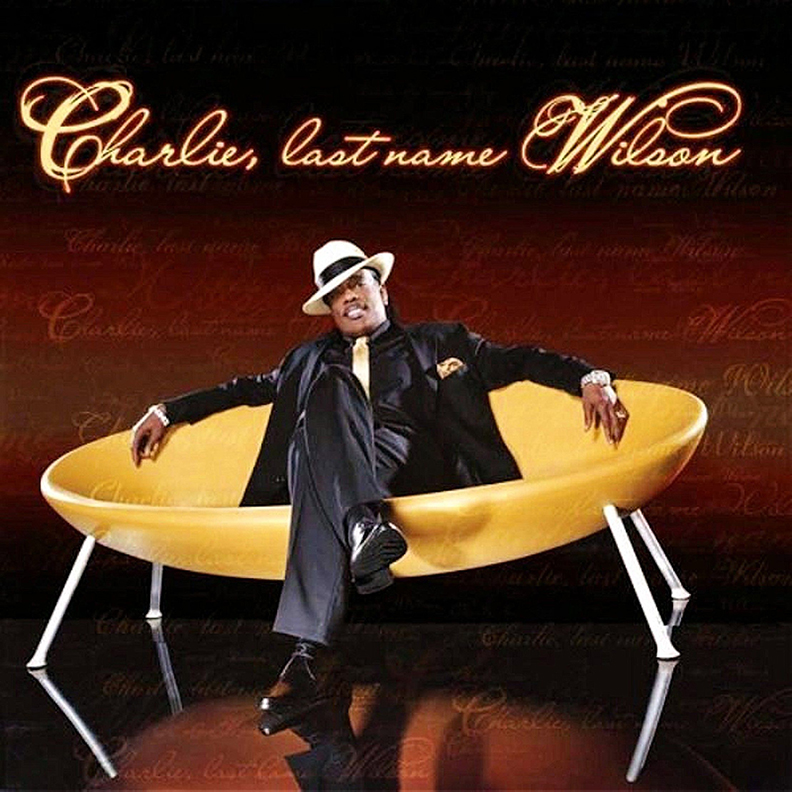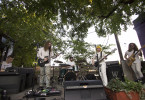Listen: Charlie Wilson has come unstuck in time.
I evoke the opening line from Kurt Vonnegut’s time-bending Slaughterhouse-Five to suggest that there is something about Charlie Wilson, the Tulsa-raised R&B showman, that is stubbornly out of step with our current moment. That’s not a bad thing. Wilson is a deadly sincere, heart-on-the-sleeve soul man with hip-hop credibility and a storied past as a musical innovator. He’s a rare bird. His voice contains a rich cultural history, his demeanor suggests an innocuous mass-market charm, and while much of his solo work recalls a bygone era, Wilson had a firm hand in crafting some of today’s most significant and groundbreaking pop music.
That’s him all over Kanye West’s My Beautiful Dark Twisted Fantasy: “All of the Lights,” “Runaway,” “Monster,” and “See Me Now” all feature Wilson’s emotive vibrato on the hook. (West would bring him back for Yeezus standout “Bound 2,” which was nominated for two Grammys.) Elsewhere, you can hear Wilson belting it out on collaborations with marquee-busters like Pharrell Williams, Snoop Dogg, Bruno Mars, and more.
To understand how he got here, though, we need to rewind about 30 years. Charlie Wilson — known affectionately as “Uncle Charlie” — first made his name as the lead singer of funk-R&B trio The Gap Band. Along with his two brothers, Ronnie and Robert, these three preacher’s kids from Oklahoma helped usher in a new musical era. Unstoppable singles like “You Dropped a Bomb on Me” and “Early in the Morning” married four-on-the-floor time signatures with synth-heavy hooks and rich vocal production, and they helped American pop music pivot from the club-centric disco stylings of the late 1970s into the more sonically restless territory of the early ’80s.
After a dark period of homelessness and substance abuse in the ’90s, Wilson made an improbable return to the spotlight. In 2005, he dropped his most invigorated solo album to date, Charlie, Last Name Wilson. Produced by R. Kelly, this pristine collection of love songs, sex jams, and polite club bangers demonstrates what makes Wilson such a quietly enduring figure. The album is a dazzling, masterful display of songwriting and vocal performance, delivered by an artist whose relevance once seemed like a thing of the past. It’s a wonder more people don’t talk about Wilson, and this record in particular, as one of the great musical underdog stories of our young century.
For evidence of Last Name’s singular charm, look no further than the title track. “Charlie, Last Name Wilson” remains the most kinetic and compelling song in Wilson’s oeuvre, and it elegantly packages the central theme of this criminally slept-on LP. The song opens with a mock voicemail from R. Kelly, crackling over a delicate acoustic guitar: “Yo, C. We need to get out and do something, man. Got all these hot cars and hot cribs, but ain’t got nobody to share it with, baby. Know what I mean?”
Wilson drops in with a sultry, “hey girl,” and launches immediately into the most infectious chorus any pop artist has managed in the last 15 years. (Really, if you’re not having fun by this point, you’re hopeless.) After sweetly chirping that “being in love is good for your health,” he laments that he doesn’t have anyone to share his life with. Wilson is determined to change that. “Here is my number,” he bellows during the song’s climax, his voice rising with manic intensity. “My manager’s number, my studio number — even my momma’s number!”
Consider this the album’s thesis statement. Here’s Wilson, our vulnerable hero: the lonely playboy, marooned by wealth and success, pummeled by an intense desire for connection. He lives large, but there’s a void that only shorty’s love can fill. It’s a simple and clean conflict for a songwriter’s purposes — one that Drake would build a career around five years later — and it cements Wilson’s authorial point of view as the hopeless romantic with golden rims and golden pipes.
Elsewhere, slow-burning bedroom jams like “Let’s Chill” and “Asking Questions” bring to mind the best parts of ’90s radio R&B, replete with slick, pitch-shifting synthesizers and sexy cymbal splashes. Wilson’s stable of peculiar vocal tics (like “ooh-wee” and “shabba-dabba-tweet-tweet-tweet”) pepper these songs in a way that makes them seem more like involuntary biological processes than showboating affectations. You’d groan from the silliness of it all if it weren’t delivered with such authenticity and charisma, if it weren’t so squarely, undeniably good.
And that’s the case for most of Charlie, Last Name Wilson. This album shouldn’t work. The thing shouldn’t hang together so seamlessly. A soft-spoken, 53-year-old preacher’s son from Oklahoma, whose last hit single was released in 1982, shouldn’t still have this sort of fire in his voice. He shouldn’t be able to rebound from those strung-out years on the street with such poise, bouncing back into the pop arena as if he had never left it in the first place. This record shouldn’t be so compulsively playable, so delicious, 10 years after the fact.
It should be impossible, but it’s not. That’s the story of Charlie Wilson.





